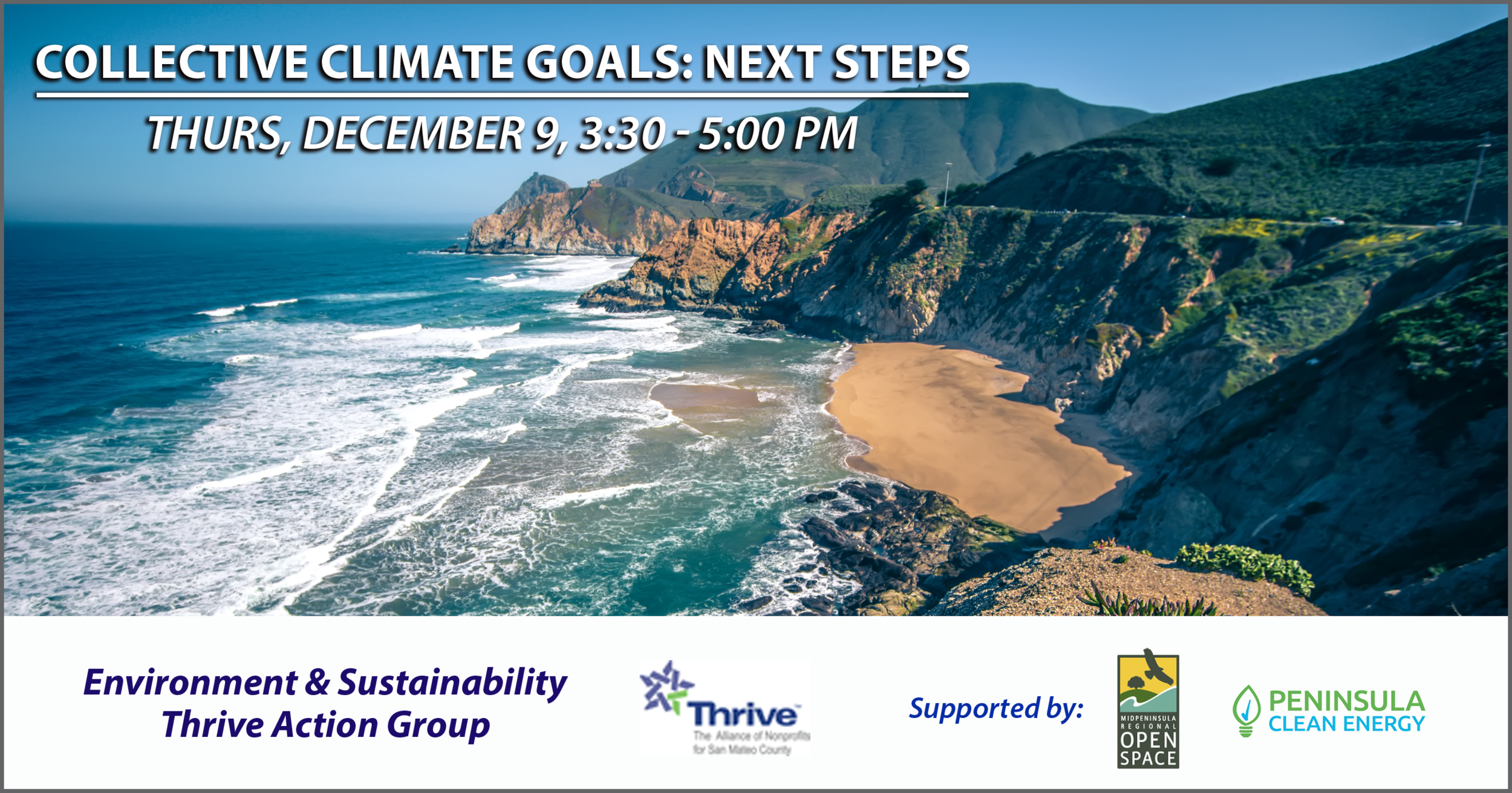Collective Climate Goals: Next Steps
Thursday, December 9, 2021, 3:30 PM, Zoom Recording & Live Document
MEETING RECAP
This meeting was a culmination of all of the work Thrive's Environment & Sustainability group has done to create collective climate goals for San Mateo County and their community. As the past meetings have been focused around creating systems based on the audience's priorities and looking at areas for collaboration, the overarching goal for this meeting was to determine whether the narrowed down themes and their goals were the right objectives we want to collectively accomplish. We were once again joined by Matt Biggar, PhD., founder of Connected to Place.
As a quick recap over what happened in our October meeting, Matt went over the different climate-focused systems that emerged and the their rankings from the survey results at our previous meeting. Combined with ideas from the Program Committee, Matt condensed the multitude of systems into four overarching themes: Adaptation, Buildings & Energy, Food, and Transportation. Each theme had different goals that San Mateo County stakeholders would collectively accomplish as well as a focus point for organizations to collaborate around and work towards achieving. In addition, education was another important theme; however, as it cut across all four themes, it was included as part of a goal or a common thread built into the different themes.
After the recap and introduction of the four themes, we opened a breakout room for each of the them, letting the audience select which room/topic to discuss further. In each breakout room, they would review the goals relating to each theme and discuss how the goals meet or do not meet the criteria of: potential for collaboration, climate justice, climate mitigation, and climate resilience. Additionally, each breakout room could also suggest additional goals or revisions that do meet the criteria and will help the goals have a broader appeal, to both the San Mateo County community and different organizations. Interestingly, although there were four themes, there was an equal divide of the audience into two groups: Buildings & Energy and Transportation. As there were only two groups, after the breakout session, there was time for a lengthy discussion for each theme.
The Buildings & Energy group focused on crafting a goal that encapsulated the idea of increasing energy efficiency and electrifying buildings. While creating this goal, they realized that this issue was really an advocacy and a public education goal as this would require changes in building codes across several cities as well as education for community members on the benefits of switching to energy efficient appliances. In addition, they emphasized the environmental justice aspect of their goals as gas stoves contribute to higher asthma rates, especially if homes are located closer to highway. Furthermore, renters that live along highways may have an even harder time switching out appliances as landlords may be unwilling to do so. For these reasons, they emphasized the need for affordable electric appliances and ensuring the cost of electrification upgrades do not lead to increases in rent.
The Transportation group took the summary of the transportation theme, "affordable, healthy, safe, and climate-friendly transportation" and used it as a blueprint for their goals. They focused on creating infrastructure for public transit as well other modes of transportation such as bikes, scooters, and walking. In addition, they added a goal focused on electric vehicles, accelerating the conversion from personal vehicles to electric and investing in charging infrastructure. Something they kept in mind was making sure that the new/upgraded transportation infrastructure would take into account the neighborhoods the organizations would be working with and impacting.
In our upcoming E&S TAG meetings for next year, we will be discussing ongoing collaborations focused around each of the four themes, talking about what different organizations and coalitions exist and what they are already doing. We will begin by looking at the Buildings & Energy theme at our first meeting on January 20 and Transportation on February 24.
Facilitator:
Matt Biggar - Connected to Place
Resources:
Connected to Place: Website, Place-based systems
Live Document: Summary of the past three Environment & Sustainability meetings



